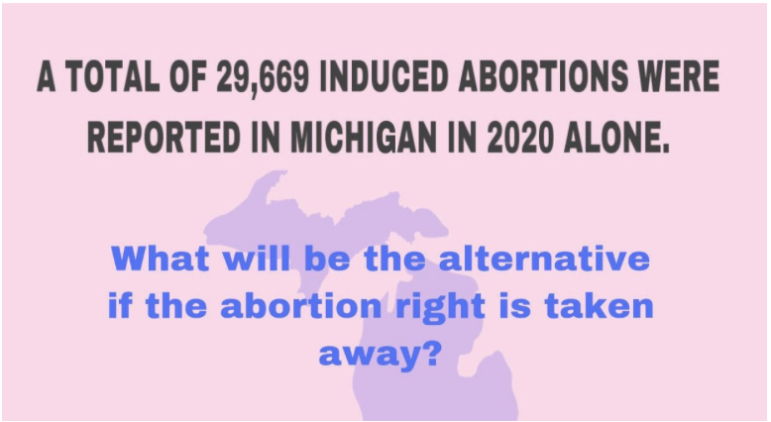Health specialists and residents in Detroit are fighting to protect women’s reproductive rights, as the United States reaches its highest number of abortion restriciton laws this year since Roe vs. Wade in 1973. The record for abortion restrictions in a single year was 89 in 2011. This year, 2021 already has 106 abortion restrictions.
Women’s reproductive rights grant women the ability to make personal decisions about their bodies, including the right to abortion and to use contraception.
“Women’s rights shouldn’t be political,” said Amanda Mcclenahan, a physician’s assistant in the gynecology unit at Henry Ford Hospital. “I think that it has created one issue: voters, who disregard other serious political issues just to ensure the rights of a fetus.”
Detroit residents speak out
With abortion a prevalent topic, Detroit residents have not sat silent. In early October, when Texas passed its abortion ban, hundreds of people met in downtown Detroit to protest.
The focus on Detroit comes from its historical involvement with women’s rights in Michigan. In October, Detroit held a women’s march where they argues that the wealthy will always have access to abortion.
About 31% of Detroit lives below the poverty line, which is an estimated 191,280 people. An expansive population that would statistically be most affected by the illegalization of abortion compared to wealthier cities within the state and within the country.
According to the 2019 Census, Detroit’s population, nearly 53% are women and 42% of those residents are African American. Black women have fought for years for the rights to control their body.

Chloe Portiflio
Source?“There hasn’t been a time in my life as an aspiring OB/GYN that I haven’t heard about minority women being mistreated in hospital settings,” said Breanna Williams, a Detroit resident. “As an African American woman myself, I understand the importance of staying aware of the system and policy changes in the healthcare field that may affect my rights and it is important to continue educating other women on this topic to break the cycle of mistreatment that is oh so familiar.”
When it comes to women’s rights, Michigan as a swing state, is extremely divided over abortion restrictions. Governor of Michigan, Gretchen Whitmer, feels strongly about protecting the rights of women as she stated last August in a press conference.
“I feel lucky to live in the state that I do,” said Mcclenahan. “I think Michigan so far has done what it can to protect women’s rights.”
In that press conference, Whitmer said she has no power over federal abortion laws, “As long as I’m governor, any law to strip away fundamental reproductive rights, or weaken access to lifesaving health care, will not get my signature.”
The movement in motion
Planned Parenthood has 14 locations in Michigan and two of those locations are in the city of Detroit.
“I definitely feel like Detroit should have more Planned Parenthoods because the two we have are pretty close to each other,” said Detroit resident Azjana McClendon. “It would be a little more convenient for women in Detroit who live in different areas of Detroit.”
According to the Planned Parenthood of Michigan’s website, Planned Parenthood believes individuals have the right to make an informed, independent decisions about sex, health and family planning. Its beliefs also support the idea that women should be equal to men, thus having the same rights socially and physically.
“One of the reasons I love working for Planned Parenthood is that our goal is to always provide non judgmental care,” said Detroit’s Planned Parenthood OB/GYN, Dr. Sarah Wallett. “We take care of anyone who comes to see us and we’ll meet them where they are without judgment, recognizing that they need reproductive and sexual health care.”
Take a look at this video on Planned Parenthood in Detroit!
“Abortion is super common 1 in 4 people that can get pregnant, generally women will have an abrtion in their lifetime,” said Wallett. “Most times we know someone that has an abortion, but we are just unaware of it. People are afraid to talk about their abortion wondering if they’ll be judged and wondering if they’d have to defend their decision or explain it in a way that they don’t have to.”
“Regarding sexual and reproductive rights I think it’s the women’s choice to decide what she wants for her body,” said Marvin Pride, a male resident of Detroit and MSU student, “I don’t think a man’s input is needed for a woman’s decision regarding that.”
What will the future look like?
On November 4, 2021, a 6% sales tax will cease to be applied to menstrual products, and fully implemented in February 2022, which was signed by Governor Gretchen Whitmer.
“I feel like removing the sales tax is just one step closer to protecting women’s rights when it comes to her body,” said Detroit resident Mycah Cooper. “As women, we all have menstrual cycles and that is not in our control. It’s not fair that we pay taxes for necessities.”